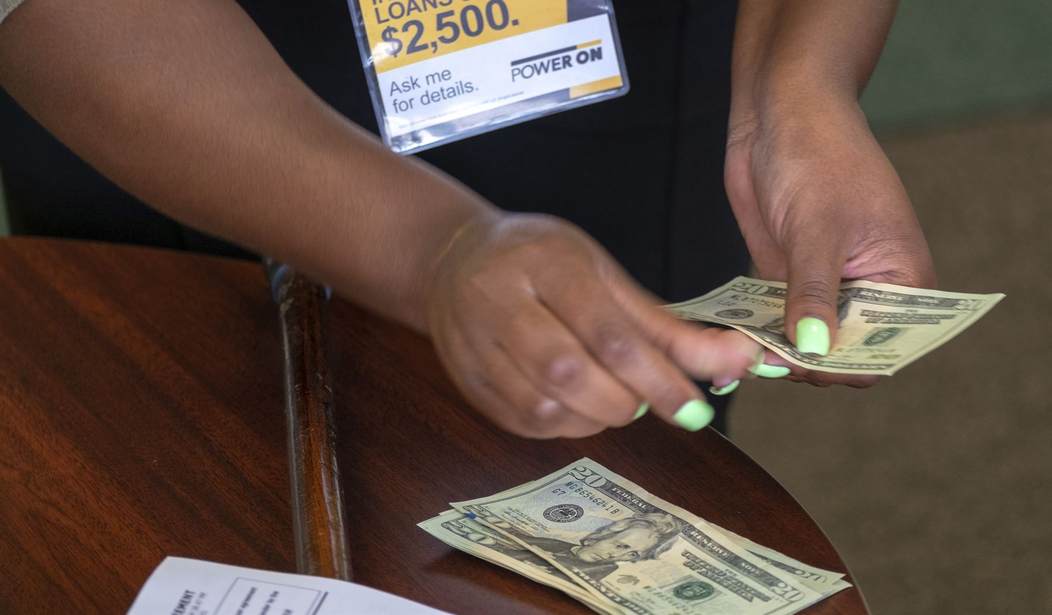Washington do-goodism almost always fails to help the people it is supposed to because politicians ignore the Law of Unintended Consequences. Nowhere is that more evident than when it comes to a congressional plan to put payday lenders and other short-term lending institutions, such as the burgeoning online lenders, out of business.
These are lenders that provide the service of last-minute or emergency loans -- typically of between $100 and $600 -- to mostly low-income Americans or those with poor credit scores. Liberal "consumer advocacy groups" and liberals in Congress demonize these companies as modern day Shylocks, the nefarious lender in Shakespeare's "The Merchant of Venice" who demands a pound of flesh if loans aren't repaid on time.
Reps. Jesus Garcia, D-Ill., and Glenn Grothman, R-Wis., are the cosponsors of a bill called the Veterans and Consumer Fair Credit Act (the bill has nothing to do with veterans, and several veteran groups have written to complain of this ruse). It would cap interest rates on short-term and emergency loans at 36%. Critics of short-term lenders say they "target" low-income and minority Americans. The left says this new law would "save" low-income Americans between $5 and $10 billion a year.
No one forces anyone to go to these stores or use online lenders. They do so because these folks feel it's the best and most convenient option for them.
The bill would make it illegal for a lender to provide someone with a $250 cash advance and then pay back the loan a week later with a $10 fee. But why? Can't consenting adults make up their own minds about whether they want to engage in this transaction? Or is the left so contemptuous of the poor they think their voters are incapable of making sound everyday decisions on their own?
Perhaps it is the Washington politicians who are financially clueless here. Well, more than half of all Americans live paycheck to paycheck today. Oftentimes these workers have poor credit scores, so they can't get a traditional loan or consumer credit from a bank. About 1 in 4 Americans without a credit card don't qualify, or if they do, they ring up debt on their Visa card, which is far more expensive than opting for a short-term payday or online loan.
Recommended
According to a 2019 Federal Reserve Board study, almost 4 in 10 Americans today would have difficulty covering an emergency expense of $400.
For Americans tangled in these kinds of financial tight spots, payday lenders are saviors, not devils. The $5 to $20 fee for an emergency cash loan is a small price to pay. Except that many in Congress don't think so. They complain that a $10 or $15 fee for a $200 loan paid back in two weeks can have an annual percentage rate interest of up to 400%. But an annual percentage rate, or APR, is a totally irrelevant statistic on a 10- or 14-day cash advance. The Wall Street Journal has calculated that the APR for a bounced check can sometimes exceed 1,300%. Are we going to eliminate credit cards, too?
One vital on-the-street reality that the consumer advocates and politicians fail to take into account is that payday and online lenders have actually helped low-income areas in an important way: They have largely replaced loan sharks. The interest rate on an unpaid loan to a loan shark isn't a $10 or $20 fee; it's a broken arm.
It also speaks volumes of the motivation of the Fair Credit Act and its supporters that the law would exempt credit unions. These are tax-exempt institutions that are direct competitors to the payday and online short-term lenders -- and they'd like nothing better than to run the competition out of town, just like McDonald's would love to shutter Burger King. Credit unions are also major funders of many of the consumer interest groups hammering payday lenders. So it might be too charitable to even say that Fair Credit Act supporters are primarily driven here by a misguided concern for the financial well-being of lower-income Americans.
But the motives really don't matter here; the results do. Run short-term lenders out of business, as some states have already done, and the victims are the people who can no longer use the convenience of these services that were once down the street. There is evidence that many Americans living near a state border drive out of the state without payday lenders into the states that have them. If Garcia and Grothman have their way, Americans won't even have the option of doing that anymore. It's a law that only a loan shark could love.
























Join the conversation as a VIP Member